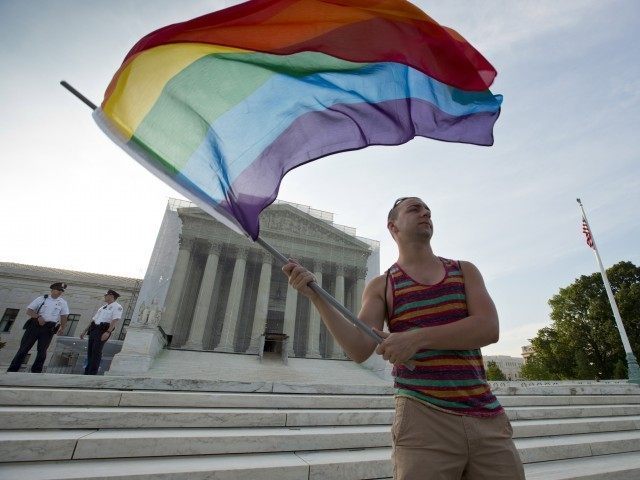The Supreme Court’s (SCOTUS) reinterpretation of a federal prohibition against employment discrimination based on sex — which now includes sexual orientation and “gender identity” — will “create a tsunami of new litigation” against religious organizations, explained Carrie Severino, president of the Judicial Crisis Network, offering her remarks on SiriusXM’s Breitbart News Tonight with host Rebecca Mansour.
The Supreme Court’s legal redefinition of “sex” to include sexual orientation and “gender identity” opens the door for further left-wing lawfare against religious organizations, Severino noted.
Severino said, “The Supreme Court left a lot of really important issues open, like, how do you balance this with religious freedom? How do you balance it with freedom of speech? If you’ve got a law, for example, saying that using someone’s preferred pronoun is mandatory — or you can be fined [for non-compliance], how do we balance that with some of these other important and even constitutional questions? Those are things that, for the most part, are unfortunately going to be just decided by a whole range of lower courts. and it will be a long time before the Supreme Court even takes up the opportunity to weigh in on that.”
Severino predicted, “These questions are going to create a tsunami of new litigation and create a huge amount of uncertainty going forward.”
LISTEN:
The Supreme Court’s decision to extend prohibitions against employment discrimination to include sexual orientation and “gender identity” will place religious and traditional organizations at a legal disadvantage when they are inevitably sued by left-wing outfits.
“You’re going to see these decisions going overwhelmingly in favor of the litigants [and] the plaintiffs who are challenging any religious organization, or any school, or anyone who wants to maintain a traditional, biologically based, scientific-based understanding of sex,” Severino forecasted.
“The logic that the court embraced” sets in motion a legal momentum for lower courts to render future decisions in favor of plaintiffs suing religious and traditional organizations for their personnel decisions, Severino anticipated.
Mansour asked if religious organizations would surrender to left-wing activist groups filing lawsuits based on the Supreme Court’s decision given their insufficient resources to legally defend themselves.
Severino replied, “That’s part of the strategy of the activists because they know that many of these organizations can’t afford to pay for defense. They can’t afford to risk a negative judgment where they could face crippling fines. If you’re talking about individuals, you’ve seen what’s happened with cases like the Masterpiece Cake Shop case, where someone’s entire business and livelihood could be destroyed and where they can face even personal threats and real concern over their own safety if they are willing to carry on litigation.”
Severino added, “I think the intimidation factor of a lawsuit is huge, and when you’ve got the court almost inviting that, it’s going to present a real challenge for a lot of people. Practically speaking, for the most part, this isn’t even going to be an issue because I think there’s the vast majority of businesses don’t have any reason or desire to discriminate on either of these bases, but there are circumstances where it is either relevant to the job qualifications or where it’s going to be an issue of conscience, and those are the ones where you’re going to have people who are going to be forced to make those tough choices between violating their own conscience and possibly losing their livelihood.”
The Supreme Court’s decision amounted to a rewriting of civil rights legislation, Severino stated.
“This had to do with the court interpreting the Civil Rights Act of 1964,” Severino explained. “We’re kind of familiar with this language. It says that no employers can discriminate on the basis of sex, of religion, of natural origin, and other kinds of classic caveats that you have, but what their question was, ‘It says you can’t discriminate ion the basis of sex. Does that also mean you can’t discriminate on the basis of sexual orientation or gender identity?'”
Severino continued, “It’s kind of a strange question to be asking because in so many states, now, and in many situations in federal law, we already do have laws preventing discrimination based on sexual orientation, but they never phrase it as ‘discrimination based on sex.’ It’s always explicitly written, ‘discrimination based on sexual orientation.'”
“What the Supreme Court did is, in an opinion, they basically just rewrote what that text said because there is a long-standing history where for decades, no politicians [and] no judge said that language meant sexual orientation, as well,” Severino added.
The Supreme Court’s decision usurps the role of legislators, Severino determined.
“That’s really a revisionist reading of the statute dressed up as textualism, and that’s one of the things that is so dangerous because we have laws that courts can effectively rewrite,” Severino concluded. “No legislator who passed [Title VII of the Civil Rights Act] would have thought it meant that.”
Breitbart News Tonight broadcasts live on SiriusXM Patriot channel 125 weeknights from 9:00 p.m. to midnight Eastern or 6:00 p.m. to 9:00 p.m. Pacific.
Follow Robert Kraychik on Twitter.

COMMENTS
Please let us know if you're having issues with commenting.